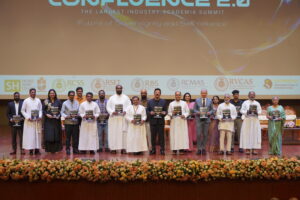PC: Amit Shibu
The walls of the Vatican witnessed a generous soul with winsome candor. He did not wear any ornate vestments or rings adorned with jewels but a simple white cassock and his zucchetto—a humble reflection of his humility and radical kindness.
Choosing his papal name as Francis after Saint Francis of Assi, in reflection of his theory of compassion and as an appreciation of the natural world which he called the “Mirror of God”, he conveyed the importance of fraternity in a fragile world.
Pope Francis (born Jorge Mario Bergoglio), the first Jesuit, the first Latin American pope and the first non-European pontiff was one of the most renowned and influential spiritual leader of the 21st century. Known for his modesty, Pope Francis reshaped the structure of the Catholic Church moving away from tradition and giving it a new, global perspective. His innovative approaches of papacy invited both admiration and fierce opposition. From the decentralisation of authority to local bishops, to involvement of women leadership in the Vatican, he consistently favoured inclusion over exclusion and mercy over judgement. He was a paradox: a traditionalist following ancient doctrine, while never failing to be expressive about the progressive perspective on current situations. His philosophical and theological ideologies attracted billions of people all over the world. From compassion for the poor, to being the global figure echoing the sounds of migrants and the needy, he became known as the “People’s Pope”.
He had displayed his faith not through words but through actions. “A little bit of mercy makes the world less cold and more just”, he once said. His visits to Rohingya refugees, homeless immigrants, war survivors in South Sudan, and the countless others in forgotten corners where the world just sits and overlooks, reflected his egalitarian ideologies. He was never a part of political feuds or unethical fights. He raised his voice and extended his hands to the deprived when everyone else was busy fuelling war, digital connections and modernised extremism.
Not all Catholics were supporters of his stances. Despite criticism, his endearing and pacifying effort to bring about world peace was not hindered in the slightest. His acts of altruism were not merely a practice of power but of presence. In an exclusive interview with La Civilta Cattolica, he said, “The shepherd must smell like sheep”.
He was the “I am one of you” Pope to live in the Vatican guesthouse, rejecting the grandeur of the highly polished marbles of the Apostolic Palace. Pope Francis changed both the tone and posture of the papacy. Through his commitment towards interreligious communications, and standing as an embodiment of human dignity over indifference, he redefined the conventional approaches to spiritual leadership. He had a progressive approach in a polarised world where faith was not impregnated from a distance but displayed through his actions. He always had a voice for the marginalised and wanted to eliminate ecological disputes and environmental issues. From the massive heap of diverse topics scattered all around, Pope Francis chose “Environment” for his first encyclical. In his 12 years of papacy, he had always highlighted his concern for the same while preaching about the interconnectedness between nature and mankind. Pope Francis asserted that everything including nature and all other living organisms are inseparable from the fate of struggling mankind. His understanding of such a complex topic earned him the admiration of great scholars, some of whom quoted him in speeches that they gave in gatherings that led to the Paris Agreement. He never missed an opportunity to express his concern for the crying earth. Pope Francis met with the Swedish political activist Greta Thunberg during the peak of her campaign, drawing the attention of the world to urgent environmental issues. His deeply reflective thoughts regarding critical issues facing humanity were unveiled in his two encyclicals “Fratelli Tutti” and “Laudato Si”.
Under him, the Vatican had undergone massive reform, shedding layers of formal approaches and bringing a human touch to the papal tone. There were gestures that broke from tradition resonating his deep-seated thoughts on the power of compassion and empathy. During his visit to Lampedusa in Italy, he called for a reawakening of consciences, thereby becoming the voice of the voiceless.
Adriana Capelli, a researcher at the Catholic University of Portugal, dedicated her work to Pope Francis’s teachings which further highlights the Pope’s stance on environmental actions and social justice. His words transcended the church walls, reverberating through the ears of environmentalists, world leaders, atheists and even the youth all over the world; truly a moral compass in uncertain times.
The last Sunday in the month of September was acknowledged as an opportunity for churches to flesh out their ideas on the struggling life of migrants. The World Day of Migrants and Refugees (WDMR), was seen as a chance to tend to the wounds of the immigrants. In 2025, Francis chose the theme “Migrants, Missionaries of Hope”, outlining his vision with four core principles—to welcome, to protect, to promote, and to integrate.
Throughout his papacy, he remained a humble pastor who was deeply loved by his followers. From travelling in public transport, eating with the poor, cooking his own supper, leaving posh amenities, he had already overthrown the baseless dominating hierarchical architecture that bred prejudice and stereotypical hatred. On various occasions he expressed that his deepest fear is “being self-centred”.
As the world grew more divided, he stood as a bridge between tradition and progress. Whether known as a reformer or revolutionary, the values he instilled, the compassion he culminated, the empathy he invigorated, and the kindness he kindled, his leadership was one that was not only confined to Church archives, but etched into the conscience of a changing world.
He once said, “Let us dream, then, as a single human family, as fellow travelers sharing the same flesh, as children of the same earth which is our common home, each of us bringing the richness of his or her beliefs and convictions, each of us with his or her own voice, brothers and sisters all”.






